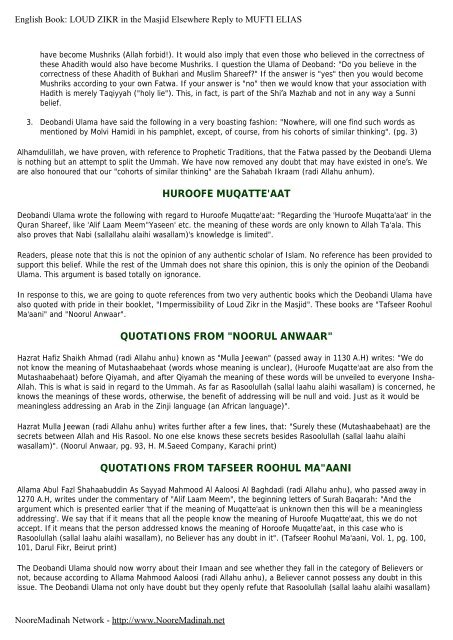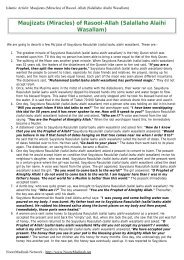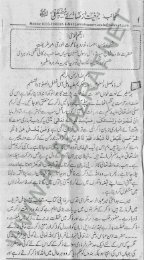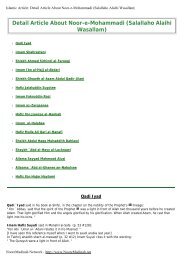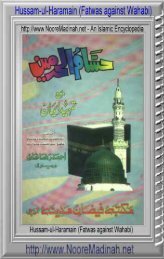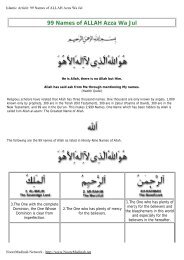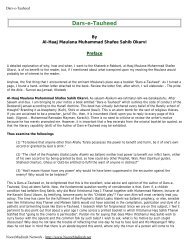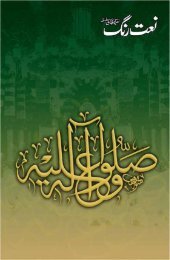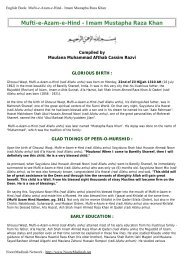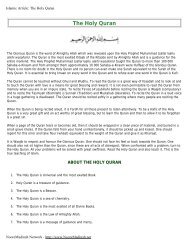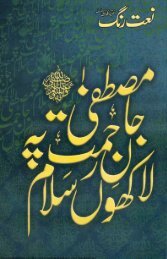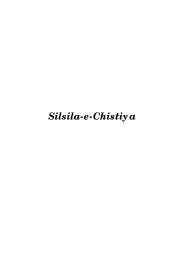LOUD ZIKR in the Masjid & Elsewhere & Reply to MUFTI ELIAS
LOUD ZIKR in the Masjid & Elsewhere & Reply to MUFTI ELIAS
LOUD ZIKR in the Masjid & Elsewhere & Reply to MUFTI ELIAS
Create successful ePaper yourself
Turn your PDF publications into a flip-book with our unique Google optimized e-Paper software.
English Book: <strong>LOUD</strong> <strong>ZIKR</strong> <strong>in</strong> <strong>the</strong> <strong>Masjid</strong> <strong>Elsewhere</strong> <strong>Reply</strong> <strong>to</strong> <strong>MUFTI</strong> <strong>ELIAS</strong><br />
have become Mushriks (Allah forbid!). It would also imply that even those who believed <strong>in</strong> <strong>the</strong> correctness of<br />
<strong>the</strong>se Ahadith would also have become Mushriks. I question <strong>the</strong> Ulama of Deoband: "Do you believe <strong>in</strong> <strong>the</strong><br />
correctness of <strong>the</strong>se Ahadith of Bukhari and Muslim Shareef?" If <strong>the</strong> answer is "yes" <strong>the</strong>n you would become<br />
Mushriks accord<strong>in</strong>g <strong>to</strong> your own Fatwa. If your answer is "no" <strong>the</strong>n we would know that your association with<br />
Hadith is merely Taqiyyah ("holy lie"). This, <strong>in</strong> fact, is part of <strong>the</strong> Shi’a Mazhab and not <strong>in</strong> any way a Sunni<br />
belief.<br />
3. Deobandi Ulama have said <strong>the</strong> follow<strong>in</strong>g <strong>in</strong> a very boast<strong>in</strong>g fashion: "Nowhere, will one f<strong>in</strong>d such words as<br />
mentioned by Molvi Hamidi <strong>in</strong> his pamphlet, except, of course, from his cohorts of similar th<strong>in</strong>k<strong>in</strong>g". (pg. 3)<br />
Alhamdulillah, we have proven, with reference <strong>to</strong> Prophetic Traditions, that <strong>the</strong> Fatwa passed by <strong>the</strong> Deobandi Ulema<br />
is noth<strong>in</strong>g but an attempt <strong>to</strong> split <strong>the</strong> Ummah. We have now removed any doubt that may have existed <strong>in</strong> one’s. We<br />
are also honoured that our "cohorts of similar th<strong>in</strong>k<strong>in</strong>g" are <strong>the</strong> Sahabah Ikraam (radi Allahu anhum).<br />
HUROOFE MUQATTE'AAT<br />
Deobandi Ulama wrote <strong>the</strong> follow<strong>in</strong>g with regard <strong>to</strong> Huroofe Muqatte'aat: "Regard<strong>in</strong>g <strong>the</strong> 'Huroofe Muqatta'aat' <strong>in</strong> <strong>the</strong><br />
Quran Shareef, like 'Alif Laam Meem''Yaseen' etc. <strong>the</strong> mean<strong>in</strong>g of <strong>the</strong>se words are only known <strong>to</strong> Allah Ta'ala. This<br />
also proves that Nabi (sallallahu alaihi wasallam)'s knowledge is limited".<br />
Readers, please note that this is not <strong>the</strong> op<strong>in</strong>ion of any au<strong>the</strong>ntic scholar of Islam. No reference has been provided <strong>to</strong><br />
support this belief. While <strong>the</strong> rest of <strong>the</strong> Ummah does not share this op<strong>in</strong>ion, this is only <strong>the</strong> op<strong>in</strong>ion of <strong>the</strong> Deobandi<br />
Ulama. This argument is based <strong>to</strong>tally on ignorance.<br />
In response <strong>to</strong> this, we are go<strong>in</strong>g <strong>to</strong> quote references from two very au<strong>the</strong>ntic books which <strong>the</strong> Deobandi Ulama have<br />
also quoted with pride <strong>in</strong> <strong>the</strong>ir booklet, "Impermissibility of Loud Zikr <strong>in</strong> <strong>the</strong> <strong>Masjid</strong>". These books are "Tafseer Roohul<br />
Ma'aani" and "Noorul Anwaar".<br />
QUOTATIONS FROM "NOORUL ANWAAR"<br />
Hazrat Hafiz Shaikh Ahmad (radi Allahu anhu) known as "Mulla Jeewan" (passed away <strong>in</strong> 1130 A.H) writes: "We do<br />
not know <strong>the</strong> mean<strong>in</strong>g of Mutashaabehaat (words whose mean<strong>in</strong>g is unclear), (Huroofe Muqatte'aat are also from <strong>the</strong><br />
Mutashaabehaat) before Qiyamah, and after Qiyamah <strong>the</strong> mean<strong>in</strong>g of <strong>the</strong>se words will be unveiled <strong>to</strong> everyone Insha-<br />
Allah. This is what is said <strong>in</strong> regard <strong>to</strong> <strong>the</strong> Ummah. As far as Rasoolullah (sallal laahu alaihi wasallam) is concerned, he<br />
knows <strong>the</strong> mean<strong>in</strong>gs of <strong>the</strong>se words, o<strong>the</strong>rwise, <strong>the</strong> benefit of address<strong>in</strong>g will be null and void. Just as it would be<br />
mean<strong>in</strong>gless address<strong>in</strong>g an Arab <strong>in</strong> <strong>the</strong> Z<strong>in</strong>ji language (an African language)".<br />
Hazrat Mulla Jeewan (radi Allahu anhu) writes fur<strong>the</strong>r after a few l<strong>in</strong>es, that: "Surely <strong>the</strong>se (Mutashaabehaat) are <strong>the</strong><br />
secrets between Allah and His Rasool. No one else knows <strong>the</strong>se secrets besides Rasoolullah (sallal laahu alaihi<br />
wasallam)". (Noorul Anwaar, pg. 93, H. M.Saeed Company, Karachi pr<strong>in</strong>t)<br />
QUOTATIONS FROM TAFSEER ROOHUL MA"AANI<br />
Allama Abul Fazl Shahaabudd<strong>in</strong> As Sayyad Mahmood Al Aaloosi Al Baghdadi (radi Allahu anhu), who passed away <strong>in</strong><br />
1270 A.H, writes under <strong>the</strong> commentary of "Alif Laam Meem", <strong>the</strong> beg<strong>in</strong>n<strong>in</strong>g letters of Surah Baqarah: "And <strong>the</strong><br />
argument which is presented earlier 'that if <strong>the</strong> mean<strong>in</strong>g of Muqatte'aat is unknown <strong>the</strong>n this will be a mean<strong>in</strong>gless<br />
address<strong>in</strong>g'. We say that if it means that all <strong>the</strong> people know <strong>the</strong> mean<strong>in</strong>g of Huroofe Muqatte'aat, this we do not<br />
accept. If it means that <strong>the</strong> person addressed knows <strong>the</strong> mean<strong>in</strong>g of Horoofe Muqatte'aat, <strong>in</strong> this case who is<br />
Rasoolullah (sallal laahu alaihi wasallam), no Believer has any doubt <strong>in</strong> it". (Tafseer Roohul Ma'aani, Vol. 1, pg. 100,<br />
101, Darul Fikr, Beirut pr<strong>in</strong>t)<br />
The Deobandi Ulama should now worry about <strong>the</strong>ir Imaan and see whe<strong>the</strong>r <strong>the</strong>y fall <strong>in</strong> <strong>the</strong> category of Believers or<br />
not, because accord<strong>in</strong>g <strong>to</strong> Allama Mahmood Aaloosi (radi Allahu anhu), a Believer cannot possess any doubt <strong>in</strong> this<br />
issue. The Deobandi Ulama not only have doubt but <strong>the</strong>y openly refute that Rasoolullah (sallal laahu alaihi wasallam)<br />
NooreMad<strong>in</strong>ah Network - http://www.NooreMad<strong>in</strong>ah.net


